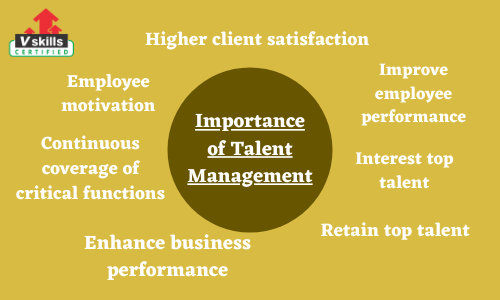Talent management involves the attraction, selection, and retention of employees, together with a combination of HR processes across the employee life cycle. The process of talent management encompasses workforce planning, employee engagement, learning and development, performance management, recruiting, onboarding, succession and retention. It is committed to hire, manage, develop, and retain the most talented and excellent employees in the industry. In fact, talent management plays an important role in the business strategy since it manages one of the important assets of the company – its people. Let us dig deeper to understand the concept of talent management.
What is Talent Management?
Talent management is a continuous process that includes inviting and maintaining high-quality employees, improving their skills, and constantly motivating them to enhance their performance. Human resources play various functions in a company. Further, the department maintains employee relations, onboarding, talent acquisition, payroll, and much more. Also, it’s the role of HR to implement the strategic talent management process in an organization. One more further responsibility of HR is talent management. This is the solution to keeping their organization leading ever closer to its aims. Also, the primary objective of talent management is to produce a motivated workforce who will stay with the company for a long period. Further, the accurate way to accomplish this will vary from company to company.
People who are good at their jobs and have very effective leadership knowledge are always inadequate in supply. They can continually find new jobs and they are constantly hard to get. Talent management is a business plan that organizations believe will allow them to maintain their topmost talented and experienced employees. Just like employee involvement or employee appreciation, it is the said business strategy that will guarantee the performance of top talent in contestants with other employers. Let us now discuss the processes and methods which are the parts of the Talent Management System.
Processes of Talent Management System
As we discussed earlier, HR really plays an advisory and support role in the company. They don’t run the company. They help the leaders run the company. An HR manager can incorporate the following arrangements when they approach talent management as their overall business strategy to hire and maintain talented employees.
- Firstly, recruitment planning conference
- Secondly, employee opening day and onboarding method
- New employee welcome data and introductions
- Next, On-the-job training
- Also, job classification development
- Further, goal framework and feedback
- Job post writing and hiring location placement for the posting
- In addition, application materials inspection
- Telephone or online screening interview
- Additionally, Credential analysis, and framework checking
- Executing the job offer to the chosen person
- Subsequently, accepting the amount of the offer
- Coaching and relationship fabricating by the manager
- Furthermore, feedbacking systems such as performance management or an appraisal method
- In-house discussions that can include multiple conferences with many of prevailing employees
- Not to mention, career outlining and pathing
- Advancements, oblique moves, transfers
- Employment terminus by the preference of the employee or caused by the owner
The importance of Talent Management
The mild answer is because it benefits employees. the employees are the most significant asset of the company. Talent management assists to maximize the importance of employees. Here are some reasons why companies should invest in Talent Management:
Interest top talent
Having strategic talent management provides organizations with the possibility to draw the most talented and skillful employees available. Also, it produces an employer brand that could draw potential talents, and in turn, adds to the advancement of the organizations’ performance and results.
Employee motivation
Having imperative talent management supports organizations to keep their employees driven and motivated which generates more understandings for them to stay in the company and do their duties. Not to mention, the proper talent management strategy will allow forming a more productive team. This is far extra useful than just holding a bunch of creative and talented personalities in the organization.
Continuous coverage of critical functions
Talent management provides companies with the responsibilities that need critical abilities to plan and discuss the important and highly specific roles in the workforce to its employees. Further, this indicates that the company will have a constant flow of employees to fill important roles to assist companies to run their operations easily and withdraw extra workload for others, which could drive to exhaustion.
Improve employee performance
The effectiveness of talent management will make it more comfortable for the companies to recognize which employees will be best entertained for the job that can drive to fewer performance management problems and grievances. Additionally, it will also ensure that the top expertise within the company stays longspun. Also, new technologies are always catching the scene, whatever the industry company belongs to. Talented employees are apt to find alternatives to check the abilities of new tools and solve obstacles or come up with innovative ideas.
Engaged employees
Talent management enables companies to make methodical and compatible decisions about the growth of staff, which assures the employees’ skills and progress. Furthermore, employees will feel extra engaged when there is a fair system for development, which assists in improving the retention rates that assist companies in reaching their operational obligations.
Retain top talent
Well-structured onboarding practices produce higher levels of retention which preserves the company on its recruitment and performance supervision cost in the long run.
Enhance business performance
Talent management encourages employees to feel skilled, engaged, and motivated, empowering them to operate in the course of the company’s business objects, which in turn, enhances customer satisfaction and business achievement. If the company has specialists with them, they can reach any goal. Talent management is most efficient of all when it connects three key elements: positive employee experience, fast talent allocation, and an imperative HR team. Further, by hiring and cultivating talented employees, the organization becomes more effective and better adapted to handle changes and risks.
Higher client satisfaction
A methodical strategy to talent management suggests that there are an organizational integration and a logical approach to management. When systems are more desegregated, client satisfaction rates are normally higher, since they are trading with fewer people and their requirements are met more rapidly. When employees feel appreciated at a company when they understand they will have lots of opportunities to progress in the business, they are less likely to try to work elsewhere.
Manager’s Key Role in Talent Management
As discussed, the HR manager can give support, training, and reinforcement, but the day-to-day communications that guarantee the new employee’s success come from the manager. Developing and coaching the employee gains from his or her active, daily communication with the manager.
Also, the HR managers can take the edge in some of the activities which are essential, primarily in recruiting and choosing new employees, and in the event of employment termination. Further, managers are also deeply concerned in the performance management system, career preparation, and so forward supervising the development of the systems.
Step By Step Talent Management Process
Identify Organization Goals And Understand The Requirement
What are your organization’s high-level priorities or goals? Note down the purposes and upcoming changes you require to induct in the organization.
Elaborate on the job classifications and specifications for the role you want to get the talent for. Since it the initial step towards the method, it presents a crucial role in the progress of the entire process.
Sourcing And Attracting The Talent
The first thing one must learn in talent acquisition is why would somebody with high-level skills come to work for you? Employment branding is the idea that comes into the game at this moment. Further, the best stuff to do for employment branding is, to be straightforward.
Hunting for the people according to the condition is the main action in this step. Look out for the platforms like Linkedin where you can search for highly talented people.
Despite the explosion of social networking sites like Linkedin and Twitter, there are still lot of different ways people find new positions. A significant amount of them comes from internal candidates and through referrals.
Employee Retention
Now that you have selected the best employees, you require to make strategies to preserve those employees. how do you retain them?
According to research, almost 51% of employers have difficulties with employee retention. However, high salary excursions and incentives are not the only stuff you should do to preserve your employees. Further, you have to build opportunities for extension and give them scope for creativity. Employees require to continue feeling that the organization is a pleasant, meaningful place to work. In addition, through training and other kinds of engagement, employees have the opportunity to build a career without departing the company. A manager may achieve this by focusing on compensation as well as company culture.
Promotion
Promote the people constantly to the new role. Because nobody wants to serve at the same label for a long period of time. This way it serves employees progress in their professional occupations.
Performance Appraisal
Estimating the performance of a worker is important to recognize his or her true potential. Further, one can examine whether the person can be filled with more responsibilities or not.
Succession Planning
Succession planning is distinct from replacement planning. It is a deliberate decision by an organization to sustain and develop the constant development of employees. Moreover, it is all about who will replace whom in the coming future.
Let us now focus on how you can be a Certified Talent Manager!
Knowledge Required
- First of all, the aspirant should contemplate getting a qualification in management, marketing, or public relations (PR).
- Also, they should try to get work experience by writing to local production companies and asking if they offer any. Keep an eye out for work experience opportunities.
Vskills Certified Talent Manager
Vskills certification for Talent Manager evaluates the candidate as per the company’s need for talent identification, retention, and management. The certification tests the candidates on various areas in the basics of talent management, strategic workforce planning, talent acquisition, performance and potential measurement, talent development, employee retention, HRMS, competency-based management, talent management integration, and standards.
Further, learn the best methods in recruiting, selecting, and bringing talent. Also, the candidate will also learn key strategies in performance measurement & employee evaluation. Also, managing & promoting talent is one of the major responsibilities in an organization. This certification will provide you with the frameworks to efficiently manage & promote talent in an organization. If you are working in HR &/or looking for new job opportunities or promotions or simply more responsibility, then you can take this certification and prove your knowledge.
Concern Areas
Getting familiar with the course is definitely a good idea. So, here we are jot downing the course outline of Certified Talent Manager.
- Firstly, Talent Management
- Secondly, Opportunities and Challenges
- Also, Financial Perspective of Talent Management
- Strategic Workforce Planning
- Then, Talent Acquisition
- Next, Performance Measurement
- Potential Measurement
- Further, Talent Development
- Employee Retention
- Moreover, HRMS or HRIS
- Competency-Based Management
- Furthermore, Talent Management Integration
Learning Resources for Talent Management
Now that we have explained the specifications for the Certified Talent Management course. Let us get to the knowledge resources of the Certified Talent Management exam so that you will ace the exam.
Online LMS
Vskills Certified Talent Management certification offers candidates to prepare themselves with the online learning material for a lifetime. The e-learning bundled with hard copy material helps to improve and update the learning curve for superior and better opportunities.
Certified Talent Manager VS-1051 Brochure
Vskills Online Tutorials
Certified Talent Manager Officer Online Tutorial enhances your knowledge and provides a depth understanding of the exam concepts. Additionally, they also cover exam details and policies. Moreover, these online tutorials provide and in-depth information related to the examination.
Try Practice Test
Practice tests are the one who ensures the candidate about their preparation. The practice test will help the candidates to acknowledge their weak areas so that they can work on them. We at Vskills also offer practice tests which are very helpful for the ones who are preparing.







